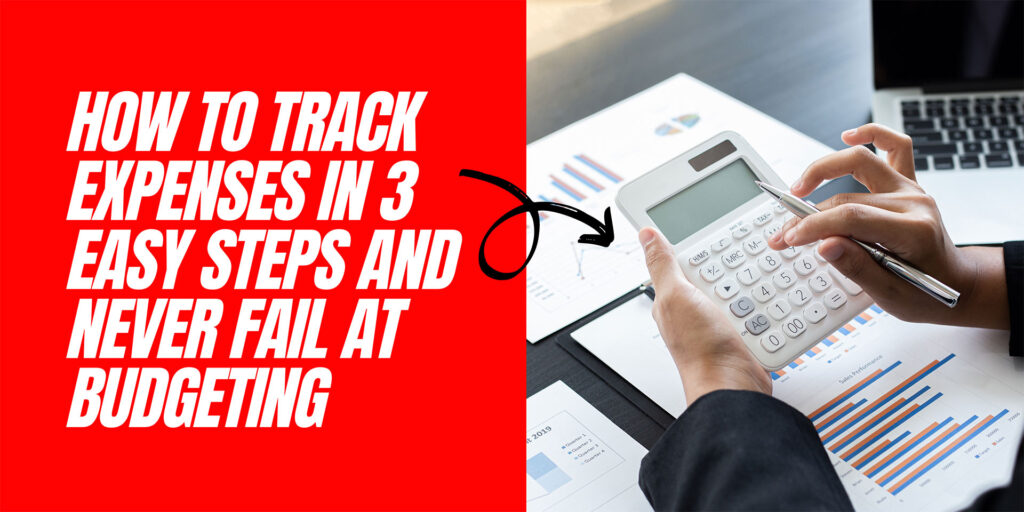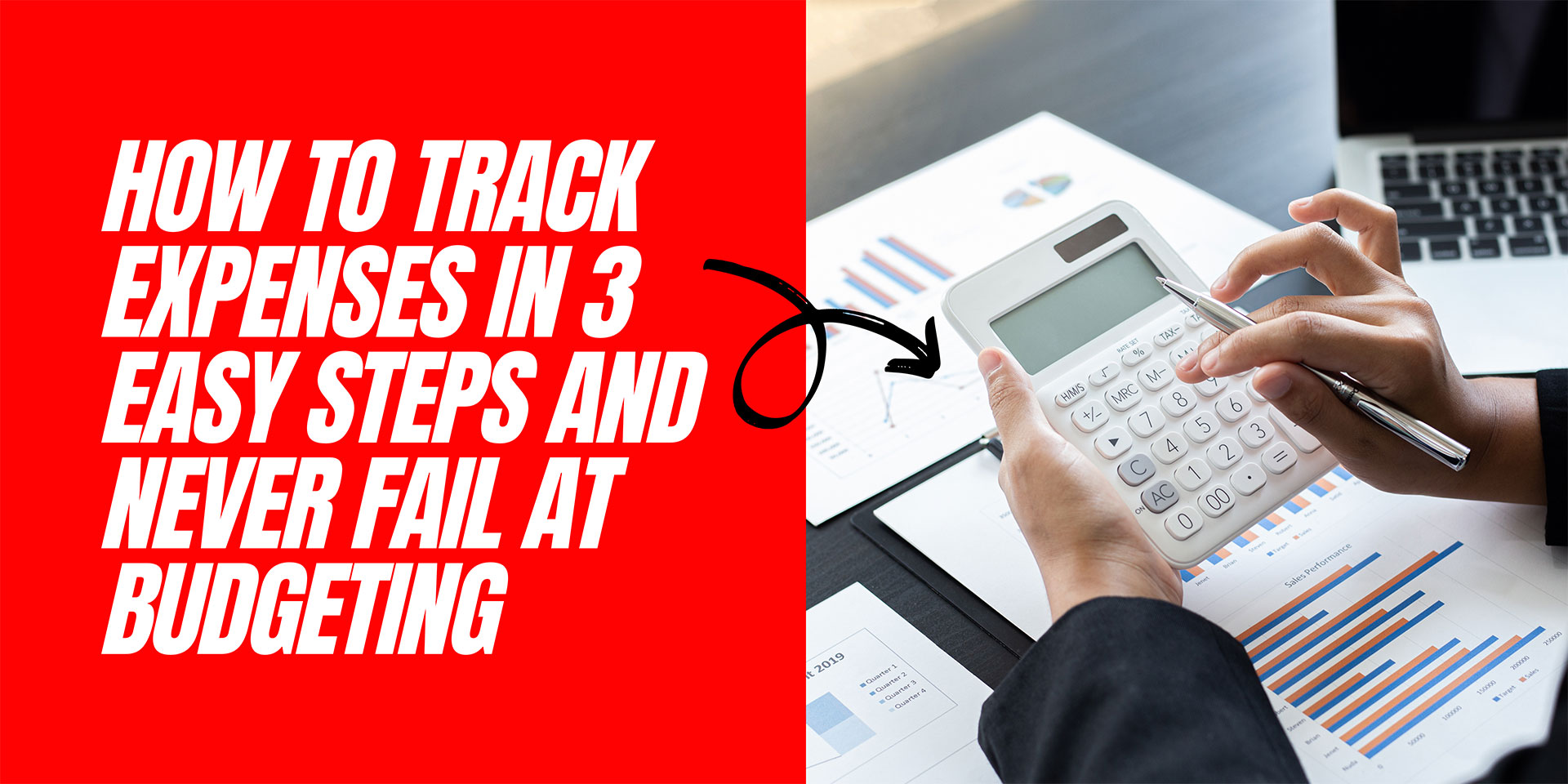
Everybody wants to save money, especially during hard times such as a pandemic. Prices of commodities go spiking and we find it difficult to manage our income and track expenses. This is the reason that we should learn some tips to track expenses and allot your money for the needs accordingly.
One of the most important aspects of making your budget work for you is keeping track of your spending. You can’t determine if you’ve overspent if you don’t know how much you’ve spent each month. Even minor costs might quickly deplete your budget.
you can save more and achieve your financial goals by properly tracking expenses. Here is a short guide to track expenses and never fail at budgeting again.
Table of Contents
3 Steps to Never Fail At Tracking and Budgeting
Create a budget
We tend to associate the term “budget” as a fun killer. They are often regarded as kill-joys or fun killers. It affects happy hour with friends as you avoid spending unreasonably and it makes you guilty when you buy things for yourself.
But in fact, it is not killing the fun, rather it is postponing fun for a better time. Budgeting makes you understand and realize that you have other priorities than these parties and expenses related to that. A well designed budget according to your income and expenses created a perfect balance between savings , expenses and fun.
The first thing you need to do is set a goal for spending and saving. Understand how much you need to spend and how much you need to save. For example, some people aim to spend only 70% of their monthly salary. The remaining 30% will be allotted for savings or emergency funds. You can set a specific budget depending on your needs for the month, week or days. You can make use to any online budgeting tools available for this purpose.
Setting up a budget may be broken down into three simple steps:
Make a list of your monthly earnings.
Make a list of your monthly costs.
Begin with basic necessities such as food, shelter (mortgage or rent + utilities), clothing, and transportation.
After you’ve taken care of those, make a note of all your other costs, such as entertainment, dining out, pan flute lessons, television streaming services, gym memberships, giving, saving, and so on.
Track Expenses
Budgeting is difficult if you’re surrounded by temptations, especially for beginners. To start with make use of a spending tracker or any tool to track expenses for the first few months. This helps to measure your goals and compare them to your behavior. Also, this way you can assess if you need to cut back from your expenses or if you’re depriving yourself too much. There are many spending trackers available online these days. They all help to categorize the spending buckets and efficiently track the money.
For people who are not that tech-savvy, make use of our old traditional ways like keeping a note or excel sheets for tracking the expenses and savings. This is also an excellent way to track expenses on a day-to-day basis.
Don’t Get Too Worked Up Over Your Budget Failure.
The first step is to keep going! The only way to fail is to surrender. Just because something didn’t fit in your budget this time doesn’t imply you won’t be able to figure it out next time! We’ve already discussed it. Failing is an inevitable part of life. You aren’t trying if you aren’t failing.
Have you failed? What’s the big deal? Continue on! There’s always something new to learn and improve on the following time! Continue to aim higher each time, and even if you don’t reach your objective, you will have progressed further than if you continued to shoot for the simple target.
Keep An Eye Out For Red Flags.
You must prepare so that you will know if it will appear again! So, what are some of the indicators you may look back on that led to your blunder? Have you had any spending triggers that caused you to overspend? Stress, poor time management, or a lack of preparation are all possibilities. Were there any unusual circumstances?
Spending sets off a chain reaction. You can also look for circumstances that may have prompted you to deviate from your budget. Was the commotion created by a certain holiday or birthday? Perhaps being with a specific set of friends makes you feel compelled to splurge. Look back and see if there are any warning signals.
Plan Beforehand.
Unexpected costs may wreak havoc on even the best-laid plans. So, what can you do if you have no idea when it’ll happen?
We’ve learnt from our personal experience that if you have an unanticipated cost, you should plan for it to happen again.
There’s a good chance this won’t be the last time this happens. Start putting money aside now to pay the fees when they arise again. The more you pay attention to your present unforeseen spending, the less likely you are to be surprised in the future.
The second thing you should do is make sure you have an emergency fund. Once you’re debt-free, save aside 3-6 months’ worth of spending in an emergency fund.
It’s a pain to have to use your money to pay an emergency, but it keeps your family secure and saves you from falling deeper into debt!
Concentrate On What’s Working For You.
You’re on the right track! You are a wise woman who knows what is best for her family! So, what’s functioning right now? What are you doing right now to come closer to your objectives? Make a note of it! That way, you won’t forget, and you’ll be able to return to your notes as a cheat sheet on what to do next time a similar circumstance arises.
Crush Your Insecurities And Emerge Victorious.
There’s no need to feel uneasy or afraid now that you’ve identified what you’re doing right and learned how to prevent and overcome prior mistakes! When you get over your stumbling block, your confidence will grow, giving you the fortitude to face whatever comes next. Your ability to handle more is going to increase!
Your willingness to work for higher goals will always bring you further! If you can simply keep going, even if it’s one breath at a time, you’ll be able to overcome your fear of the obstacles ahead.
Set Check-ins Weekly
Last but not the least stage of budgeting your money is to have regular check-ins. It is important to set financial check-ins every week once you start tracking expenses and savings. From here, you get a clear picture of your expenditures each week. You can decide if you need to cut back based on your inferences. Make proper adjustments if necessary so you can budget your money properly and save more. As you progress on your journey of financial planning, these check-ins become hassle free.
Do not give up even if you are struggling with budgeting your expenses. Budgeting makes you feel more in control over your money and it does not exist to restrict you from having fun. It allows you to track your expenditures to know exactly where you allocate your funds.
Budgeting also gives you an idea if you are spending too much on unnecessary things rather than your priorities. You can cut back from spending on things rather not as important to you. You can see and feel the positive effects of sticking to this good habit with patience and determination. After few months, you can see how much you have saved and you will be proud of yourself for starting in the first place.
Gather And Save Any Receipts From The Previous Week.
The first thing to do is keep track of all of receipts in one place. To update budget on a weekly basis, utilize these receipts in conjunction with bank app. One of the reasons to do this is that having a physical object to look at and mark off while checking in. Another reason is that to cross-reference all actual receipts with the transactions recorded in bank account, ensuring that the right amount is deducted.
Make A List Of The Totals For Each Category.
After all of the receipts are gathered, start reading through them and totaling the totals for each category. Let’s assume you purchased a coffee one day, lunch the next, like that. All these purchases should be put under Eating Out category, sum the totals of all three transactions together.
To Update Your Budget, Write In The Final Totals.
After all the categories expenses are calculates, update your budget with the actual money spend on each category. This way you can track expenses which is going over the limit.
Final Word
You must pay close attention to how you track your spending if you want to succeed with your budget. If done correctly, this will eventually lead to financial independence for you.
This may appear to be a lengthy and difficult procedure at first, but it’s actually rather simple after you’ve completed it. It will take some time to set things up at first, but after that you will be sailing. This is a game changer, and it’s now an important aspect of budgeting that you should never forget to include.




